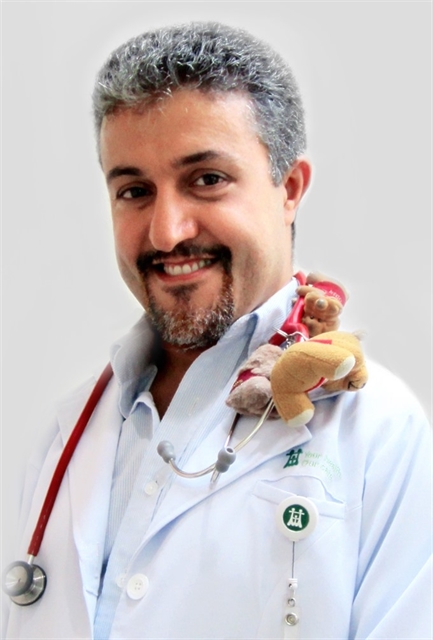 Life & Style
Life & Style


|
| Dr Jonathan Halevy. — Photo courtesy of Family Medical Practice |
By Dr Jonathan Halevy*
Halitosis not only occurs in adults but it is also common in children if parents do not pay close attention. Children with halitosis or just bad breath is one of the most common concerns of parents. There are plenty of factors that cause this condition and it is important that parents can identify the right cause in order to cure this condition. In this article, Pediatrician Jonathan Halevy will share with parents about this common problem, causes, treatments and what parents should pay attention to.
Quick myths & facts:
● Myth: Brushing your child’s teeth regularly will not cause bad breath
● Fact: Most parents only brush their children’s teeth only 30-45 seconds, which is not enough. To clean all surfaces of teeth, brush at least 2 minutes and at least twice a day. Remember to clean the tongue as well, bacteria likely wander in areas that we lack attention.
Causes of halitosis:
● Poor oral hygiene: from fungal infections, cavities, periodontitis, tartar accumulation are common causes.
● Bacteria: multiply super-fast and cling to each other on the tongue
● Breathe through mouth: When children breathe through the mouth, instead of the nasal passages (The children with nasal congestion) will make the dry mouth membranes, create conditions for bacteria to grow, making the breath bad.
● Inflammations in airways: Colds, sinusitis, tonsillitis and sore throat are also causes of bad breath.
● Pathology of hypertrophic tonsils and nasopharyngeal lymphadenopathy: Due to recurrent respiratory infections, allergies, air pollution
● Eating smelly foods: such as garlic, fish sauce, durian, processed meats, some spices
● The habit of thumb sucking or dirty pacifier
● Gastroesophageal reflux: which often causes reflux or vomiting, is also a cause of bad breath
Treatments:
● Maintain oral hygiene: clean/brush your children’s teeth with plenty of water, 2 times/day and regularly brush their tongue.
● Visit your child’s dentist every 6 months to check tooth decay and tartar hygiene
● Visit your child’s paediatrician to find out the right cause of problem
● Finding a definitive treatment of infectious and inflammatory diseases. If your children has a stuffy nose, nasal irrigation (SRM) would be helpful for them.
● If your children usually breathes through their mouth or snores during their sleep, they might have tonsillitis and nasopharyngeal lymphadenopathy. To make sure, you might need to take your child to paediatrician or ENT doctor to check.
● If your children uses a pacifier, make sure it is regularly cleaned.
● Limiting sugary foods (such as soft drinks, milk, yoghurt containing sugar, confectionery). Sugar will be fermented by the bacteria causing tooth decay and halitosis
● Don’t let your children sleep while bottle-feeding
● Using peppermint water: Put a few mint leaves in boiling water, then discard the mint leaves. Let the mint water cool, give your child a teaspoon of peppermint juice (1-2 spoons at a time). It helps cool breath, reduces reflux and discomfort in the stomach. — Family Medical Practice
*Perhaps the most well-known figure at Family Medical Practice thanks to frequently posting pediatric advice on social media, Dr Jonathan is a graduate of the Sackler School of Medicine of Tel Aviv University, then undergoing his residency in the Pediatric Department of the Wolfson Medical Center in Israel, earning his certification as a specialist in paediatrics. He first joined Family Medical Practice in 2005 and returned in 2013 following a short period in Melbourne.
A published author on pediatric care, Dr. Jonathan is frequently invited by the local community to conduct health talks, having addressed many schools and parent groups on pediatric health issues and other medical topics. His Vietnamese-language book Nuôi Con Sao Cho Đúng on the subject of children's health was released in 2015.
Family Medical Practice was the first foreign-owned primary healthcare provider in Việt Nam, and has consistently remained at the forefront of international-standard medicine since 1995. It offers extensive healthcare and emergency medical services nationwide to Vietnamese, expatriate and corporate customers.
For more advice on any medical topics, visit Family Medical Practice Hanoi at: 298 I Kim Mã, Ba Đình. Tel: (024) 3843 0748. E: hanoi@vietnammedicalpractice.com.
FMP’s downtown Hồ Chí Minh City location is: Diamond Plaza, 34 Lê Duẩn, District 1; 95 Thảo Điền, District 2. Tel: (028) 38227848. E: hcmc@vietnammedicalpractice.com
FMP Đà Nẵng is located at 96-98 Nguyễn Văn Linh, Hải Châu District, Đà Nẵng. Tel: (0236) 3582 699. E: danang@vietnammedicalpractice.com.




